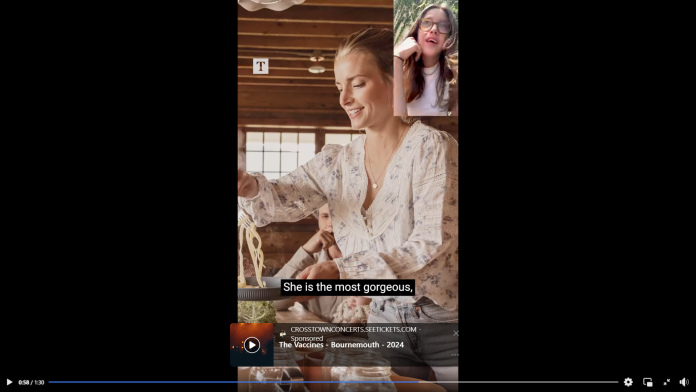
Hannah Neeleman has become an internet sensation thanks to her social media account, Ballerina Farm. The 34-year-old Mormon influencer is a former ballerina who trained at the highly prestigious music school, Juilliard in New York.
If you know who Ballerina Farm is, chances are she may have unwittingly filled your social media feeds with ‘trad wife’ content in recent weeks.
Ballerina Farm is the Instagram handle of 34-year-old Hannah Neeleman, a mother of eight who lives on a dairy farm in Utah with her husband Daniel, 35. Daniel comes from a very wealthy family and is the son the son of David Neeleman, the CEO of JetBlue. She is one of a growing number of women promoting the lifestyle of a ‘traditional wife’ to their followers on TikTok and Instagram. However, a recent interview with Neeleman has sparked controversy. The details of her relentless schedule as a homemaker have caused concern among commenters, many of whom have expressed worry for her welfare and the message being conveyed to other young women.
Neeleman, however, described the article as an “attack on her family” and stated that “portraying me as oppressed with my husband being the culprit… couldn’t be further from the truth.”
What is a trad wife?
Trad wives are women who embrace traditional gender norms and champion homemaking, childcare, and supporting their husbands. They often take inspiration from early 20th-century American housewives, are devout Christians, and express politically Conservative views. With the rise of social media, they have begun documenting their lives through Instagram and TikTok reels, usually in full hair and make-up, and often with a child on their arm as they cook, clean, or offer ‘life hacks’ for “serving” or “submitting” to their husbands.
Estee C Williams, a self-confessed trad wife with more than 100,000 Instagram followers, says in one of her videos: “Being a traditional wife is so much more than cooking and cleaning and wearing house dresses, it’s about taking your house and making it a home.” She adds that “aprons are like our house uniforms… so we can wear our beautiful clothes in our home and still protect them.” A typical video on Nara Smith’s Instagram feed is captioned: “Here’s everything my husband cooks in a day/what I cook for him.”
Professor Linda Kaye, a cyberpsychologist and associate head of psychology at Edge Hill University, says: “People who have these views have always existed – we’re just more aware of it now.” In the age of social media, she says people have more “creative” ways of declaring and reaffirming their social identities.
A study by Media Matters America suggested that viewers of trad wife content are more likely to be exposed to online conspiracy theories. Professor Kaye says online algorithms can link people with “particular types of world views” to others of “particular political persuasions,” sometimes with “toxic” consequences. But she adds that although those risks exist, human behaviour both on and offline is “hugely complex,” and multiple decision-making processes are at play to stop us “mindlessly imitating” what we see online.
Who is Hannah Neeleman?
Hannah Neeleman lives with her eight children and husband Daniel on a 328-acre working dairy farm near Kamas in Utah. Their joint business venture, ‘Ballerina Farm,’ sells meat, dairy products, and household goods, with the help of around 40 staff, from farmers to website designers.
Hannah was brought up as a devout Mormon in Utah but left home at 17 to study ballet at the prestigious Juilliard School in New York City. She told The Times in her recent interview: “I was a good ballerina. But I knew that when I started to have kids my life would start to look different.”
Neeleman was introduced to her husband by a mutual friend when he was 23, and she was 21. He told the newspaper in their interview, he was “ready to go… thinking ‘let’s get married'” as soon as they met, but she declined his offer of a date for six months. Daniel was also raised as a Mormon, in Connecticut. His father is a billionaire and set up several airlines, including JetBlue.
Hannah finally agreed to go on a date with him after he realised they were on the same flight from Salt Lake City to New York – and pulled strings through his father’s position to get them seated next to each other, he told the newspaper. They got engaged after a month and married after another two, the interview reveals. She continued to attend ballet school, but three months after their wedding fell pregnant, becoming the first in the institution’s history to be pregnant while training.
They moved from their home in New York’s Upper West Side to Rio de Janeiro in Brazil, where Daniel took a job with one of his father’s companies. Eventually, they settled back in Utah, where their family stands at eight children: Henry, 12, Charles, 10, George, nine, Frances, seven, Lois, five, Martha, three, Mabel, two, and Flora, one. Neeleman is also a beauty pageant model, making headlines in January for competing as Mrs America at the Mrs World competition in Las Vegas 12 days after giving birth. She posted that month: “What the last 12 days looked like for me! It’s been a postpartum like no other. Your Mrs. American (and baby girl American) are here and ready to roll! @mrsworldpageant.”
Does she see herself as a trad wife – and why has there been a backlash?
Asked if she identifies with the trad wife label, she replied: “I don’t necessarily identify with it because we are traditional in the sense that it’s a man and a woman, we have children, but I do feel like we’re paving a lot of paths that haven’t been paved before.” “I feel like we’re doing what God wants,” she added. Her husband then said: “We were already together, doing what we were doing. And then ‘trad wife’ came along. We can’t help it. This is what we are. If we’re trad dad, trad wife, so be it.”
Some of the details in the interview have sparked controversy. The couple revealed Hannah has no help with childcare, claims to make every meal for all 10 of them from scratch, while producing her social media content and helping with the dairy business. Her husband said she “sometimes gets so ill from exhaustion that she can’t get out of bed for a week.”
One commenter wrote: “I just read the Times article, and I am so very sad for Hannah. None of this is at all what she wanted, but she does it because Daniel wants her to. Everything about their lives is what he’s always wanted. The only thing she’s been allowed to keep is the name. That they use, as a brand. So very sad.” Another said: “Hannah! Please take time for yourself, you DESERVE things for yourself. You deserve to be happy.”
But others have criticised the critical tone of the Times article, with one person commenting: “Revelation: loads of women simply love being a wife and mother. It’s not oppression.” TV presenter Kirstie Allsopp said: “I had never seen this account before, but I looked you up and I think what you are doing is amazing.”
In response to the comments, Neeleman later uploaded a video expressing her “shock” at the tone of the article, adding that “God and family” are her main motivations. She signed off the clip: “For now, I’m doing what I love most: being a mother, wife, a businesswoman, a farmer, a lover of Jesus, and making meals from scratch.”
Why are Mormons so controversial?
The Church of Jesus Christ of Latter-day Saints (LDS Church), often referred to as the Mormon Church, has been a subject of controversy since its founding in the early 19th century. This controversy is multifaceted, encompassing historical, theological, social, and cultural dimensions. Understanding these factors provides insight into why the LDS Church continues to provoke debate and discussion.
Historically, the origins of the LDS Church and its founding prophet, Joseph Smith, are significant sources of controversy. Smith’s claims of divine revelations and the translation of the Book of Mormon from golden plates have been met with skepticism and disbelief by many. The early Mormons faced severe persecution, which led to their migration across several states, culminating in their settlement in Utah. The violent conflicts they endured, including the 1838 Mormon War in Missouri and the assassination of Joseph Smith in 1844, contributed to a legacy of mistrust and hostility.
Theologically, the LDS Church holds several distinctive beliefs that diverge from mainstream Christianity, leading to further controversy. Mormons consider the Bible to be sacred scripture but also accept the Book of Mormon, the Doctrine and Covenants, and the Pearl of Great Price as canonical. This expanded scriptural canon is a point of contention. Additionally, the LDS concept of the Godhead, which views God the Father, Jesus Christ, and the Holy Ghost as three distinct beings, contrasts with the traditional Christian doctrine of the Trinity. Another controversial belief is the LDS doctrine of exaltation, which posits that humans can become gods in the afterlife, a concept foreign to mainstream Christianity.
Social practices, particularly the historical practice of polygamy, have also contributed to the church’s controversial reputation. Although the LDS Church officially discontinued polygamy in 1890, the practice left a lasting impact. The existence of fundamentalist groups that continue to practice polygamy further complicates the church’s public image. Despite no longer being practiced by the mainstream LDS Church, the association with polygamy remains a point of misunderstanding and controversy.
Cultural and social issues, such as gender roles and LGBTQ+ rights, are significant sources of contention. The LDS Church maintains traditional views on gender roles, which emphasize distinct responsibilities for men and women. These views have been controversial, particularly in the context of modern feminist movements. Additionally, the church’s stance on LGBTQ+ issues, including its opposition to same-sex marriage and policies regarding LGBTQ+ members, has drawn significant criticism, especially in recent decades.
The LDS Church’s involvement in political and social issues has also sparked controversy. Notably, the church’s support for Proposition 8 in California, which sought to ban same-sex marriage, raised debates about the appropriate role of religion in politics. This involvement has led to concerns about the influence of the church on secular laws and the intersection of religious beliefs with public policy.
Perceived secrecy surrounding certain church practices has further fueled controversy. The sacred and private nature of temple ceremonies, which are not open to non-members, has led to misunderstandings and suspicions. These practices have sometimes been mischaracterized and have given rise to negative stereotypes and conspiracy theories. Additionally, the church’s extensive missionary efforts are often seen as intrusive or aggressive, contributing to its controversial image.
The controversies surrounding the LDS Church stem from a complex interplay of historical events, theological differences, social practices, and cultural perceptions. While the church has made efforts to address some of these issues, its unique history, beliefs, and practices continue to provoke debate and discussion. Understanding these controversies requires a nuanced examination of the various factors that contribute to the church’s complex and often contentious relationship with broader society.
The moral of this and every other story. It is cool to believe AFTER we have done our homework.
KEEP US ALIVE and join us in helping to bring reality and decency back by SUBSCRIBING to our Youtube channel: https://www.youtube.com/channel/UCQ1Ll1ylCg8U19AhNl-NoTg AND SUPPORTING US where you can: Award Winning Independent Citizen Media Needs Your Help. PLEASE SUPPORT US FOR JUST £2 A MONTH https://dorseteye.com/donate/











